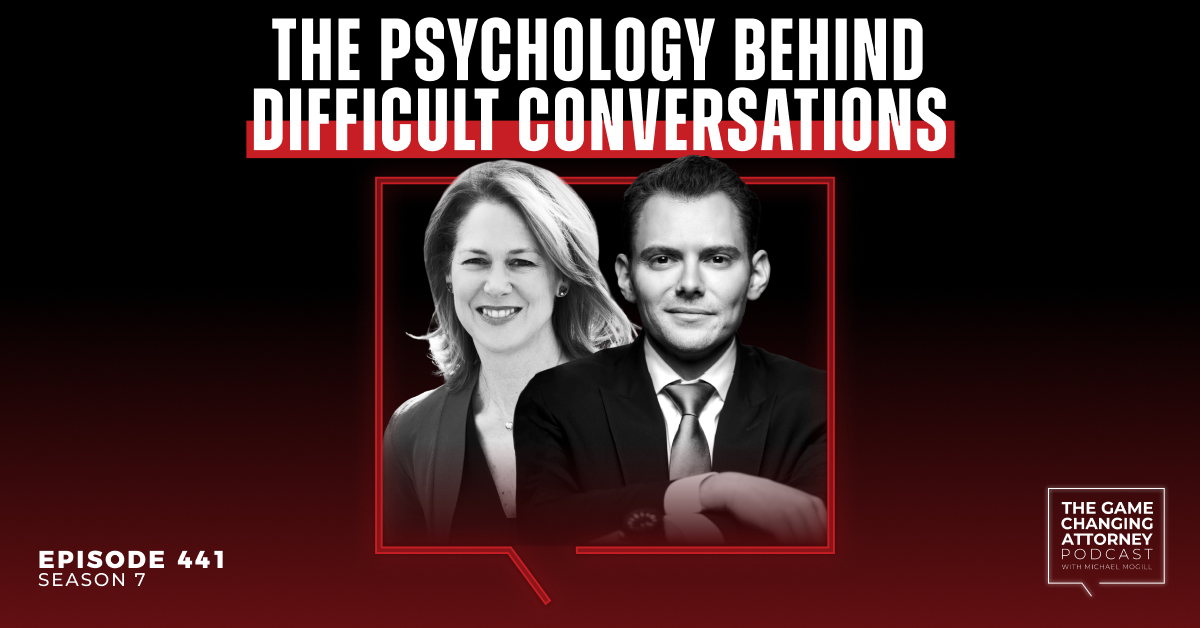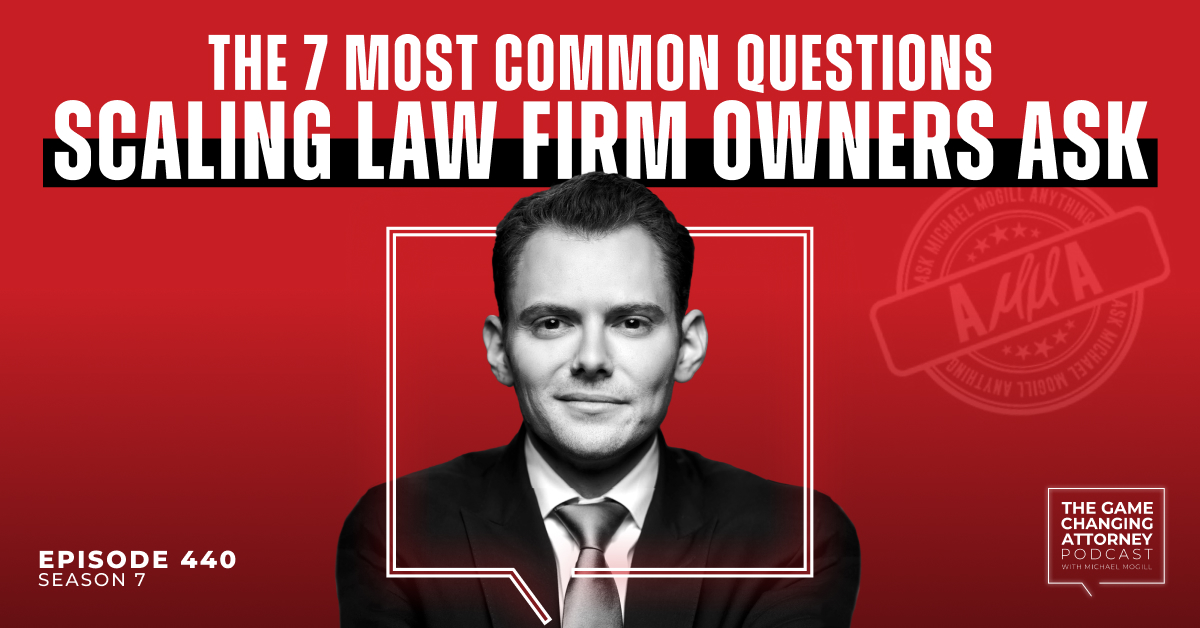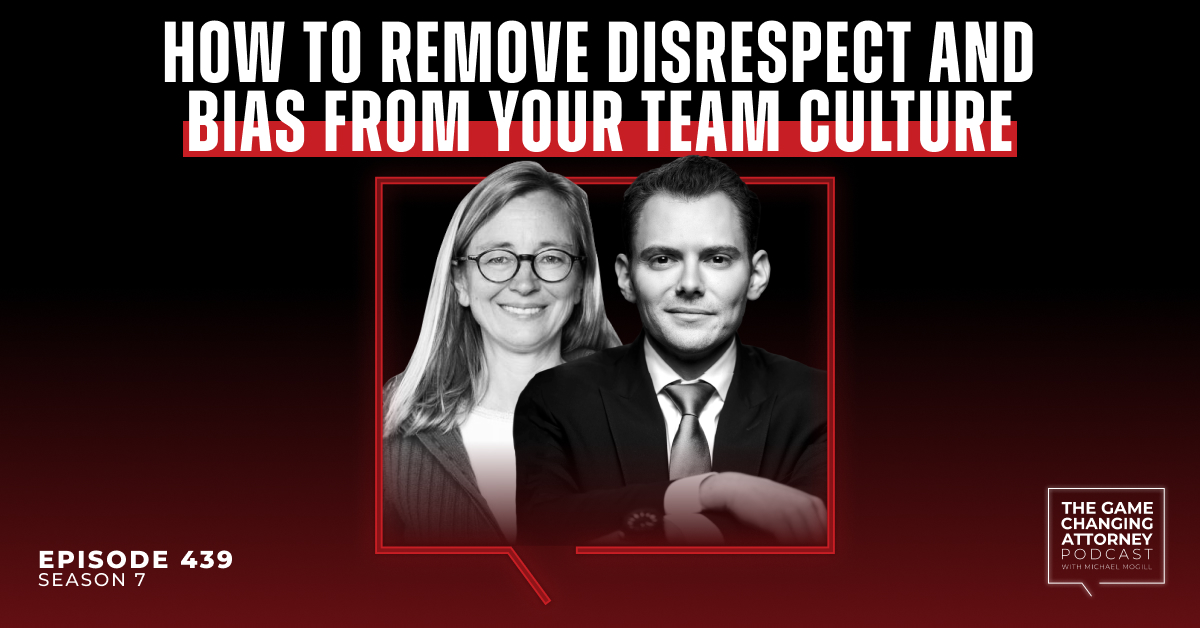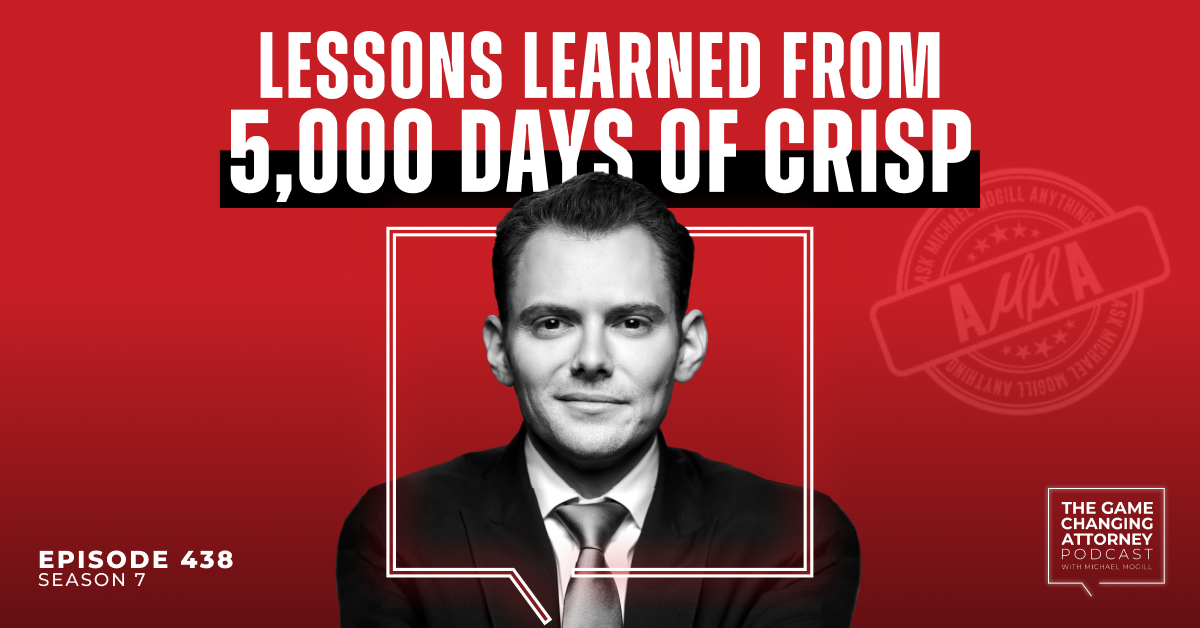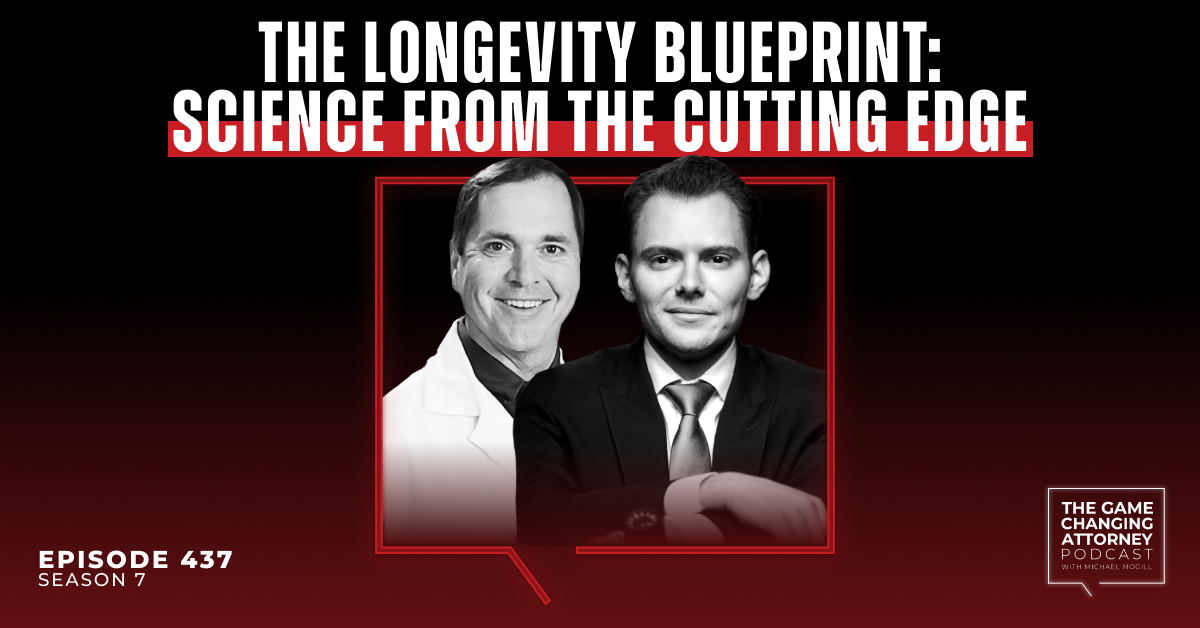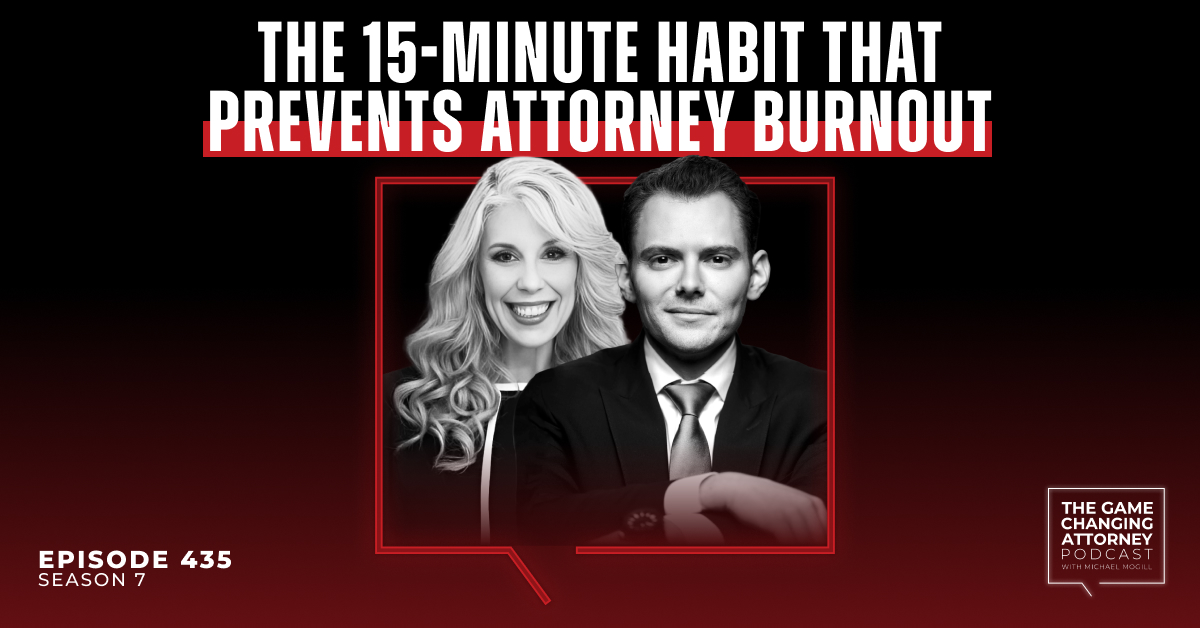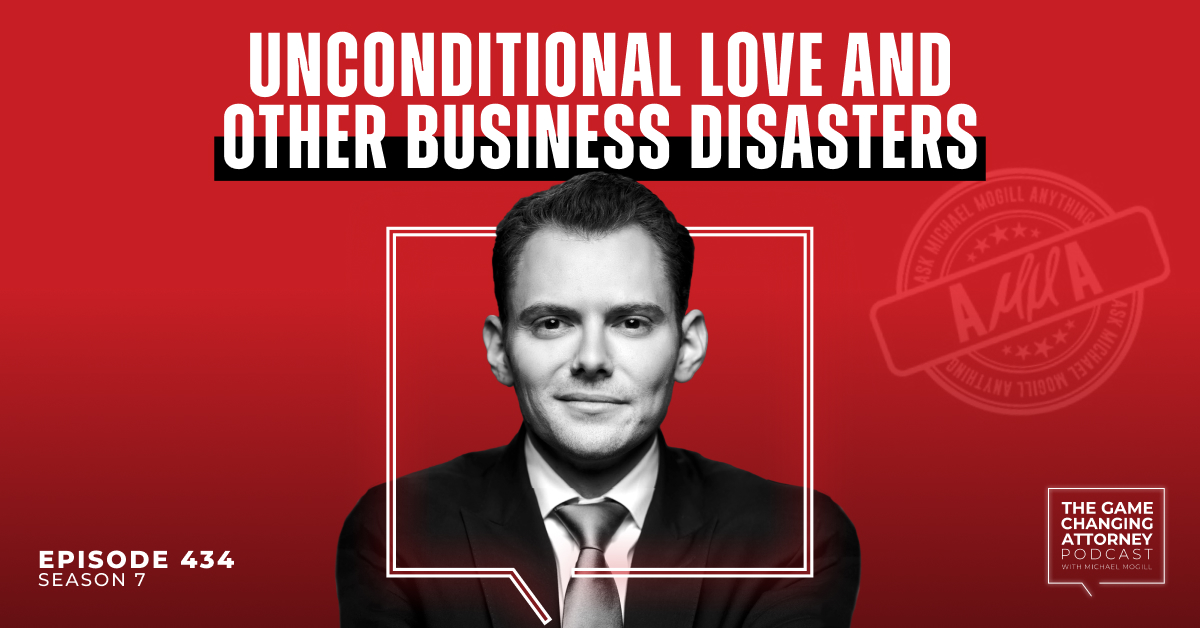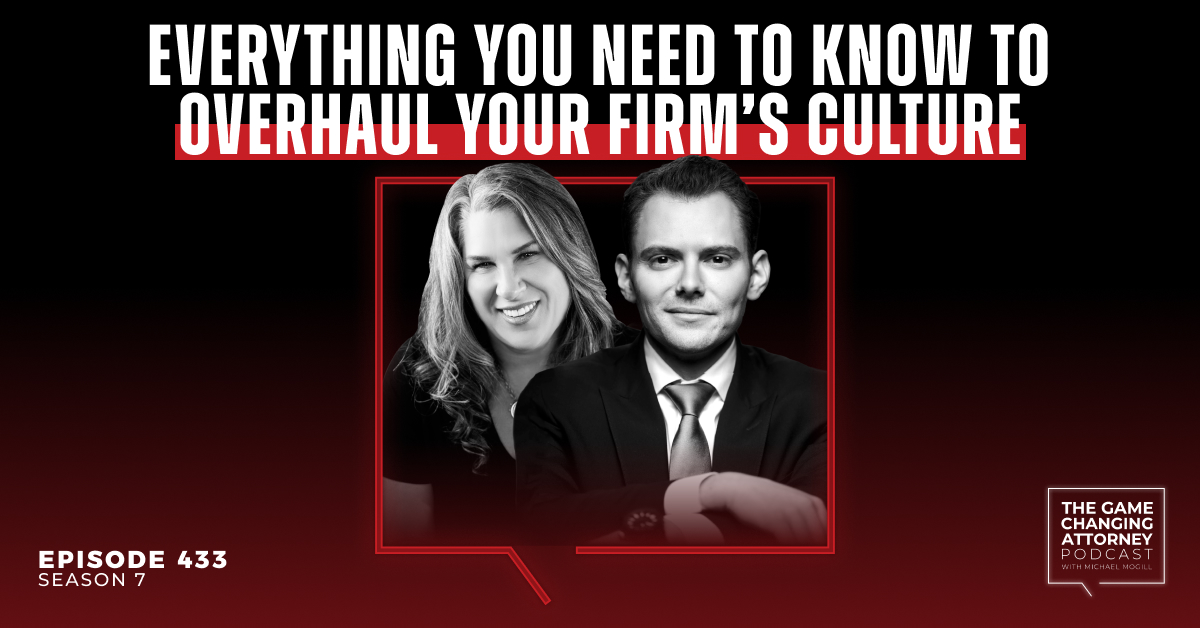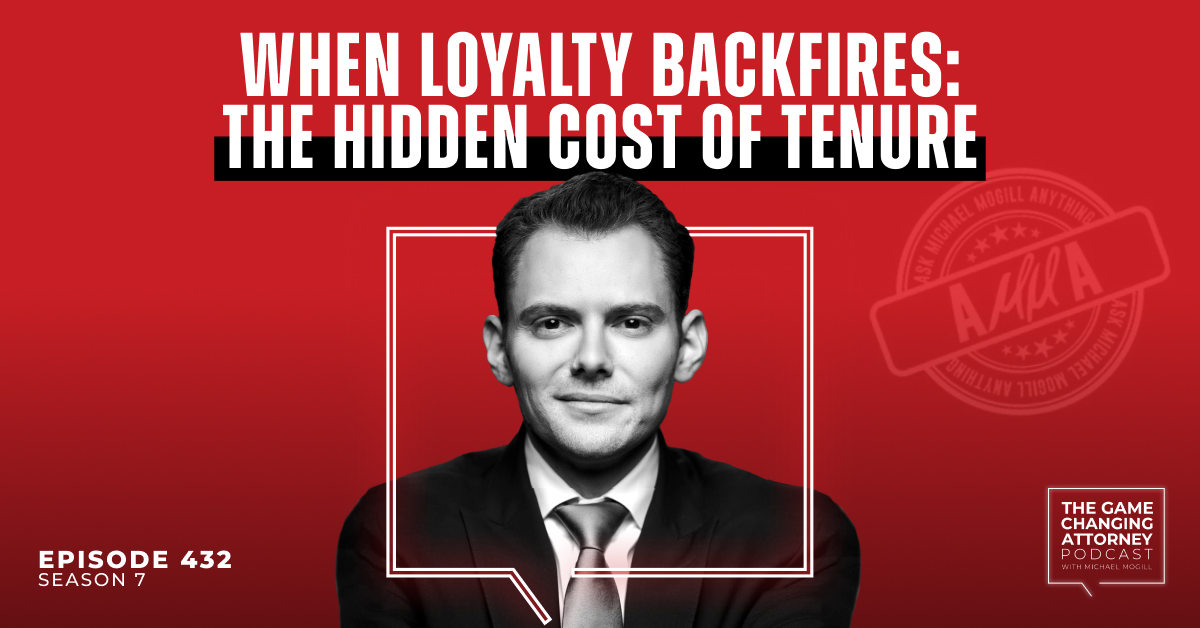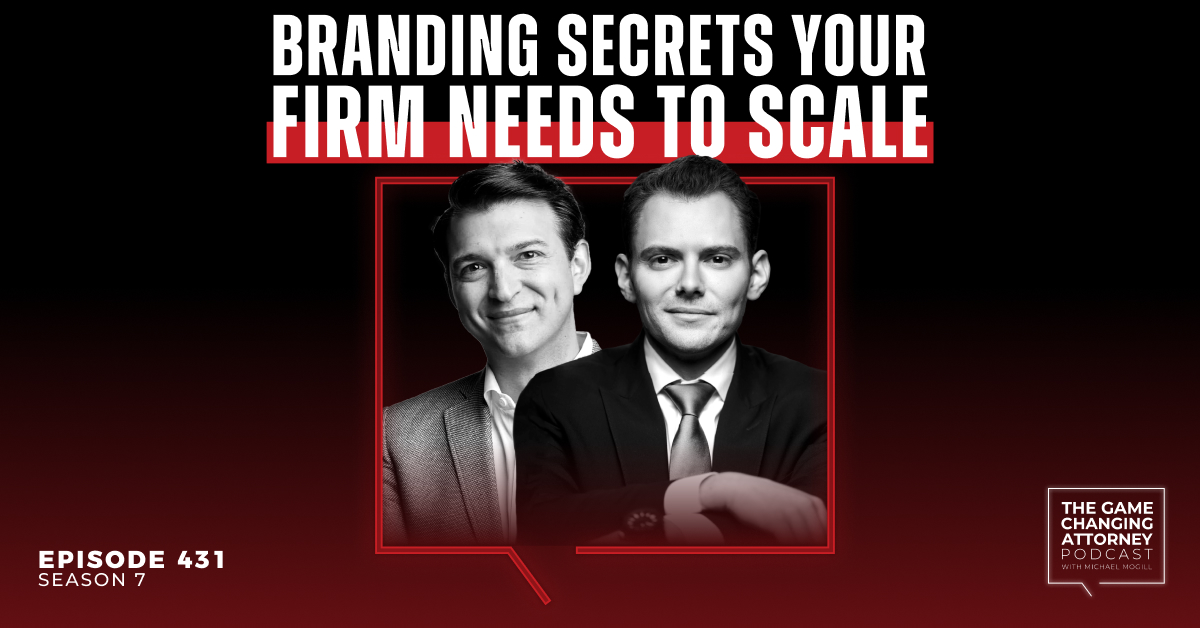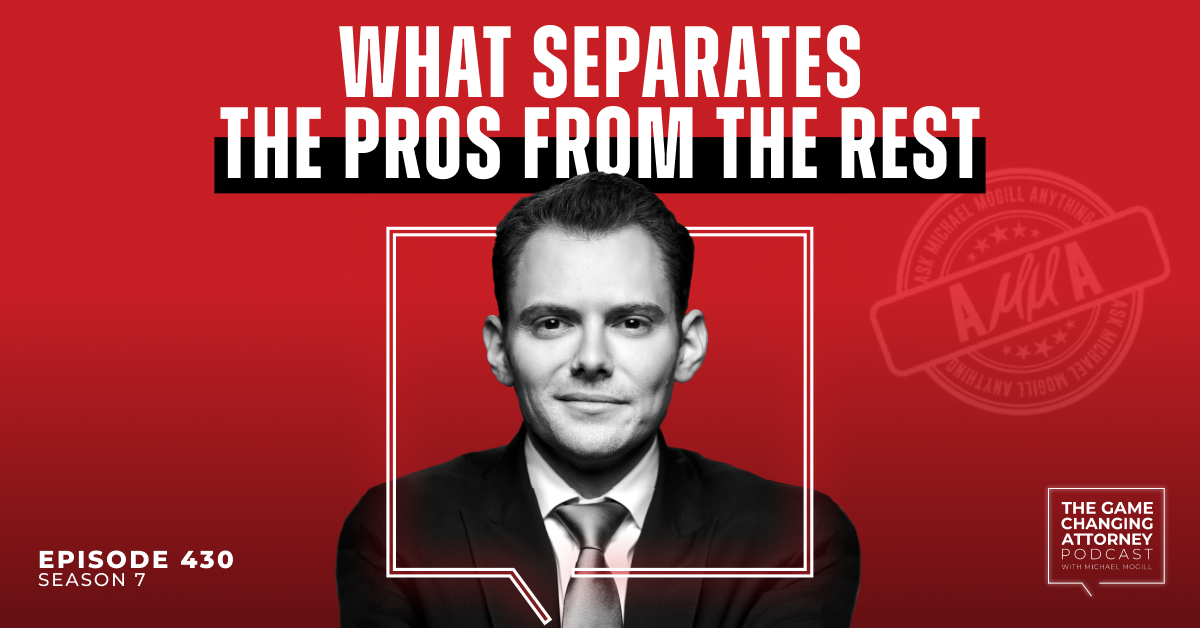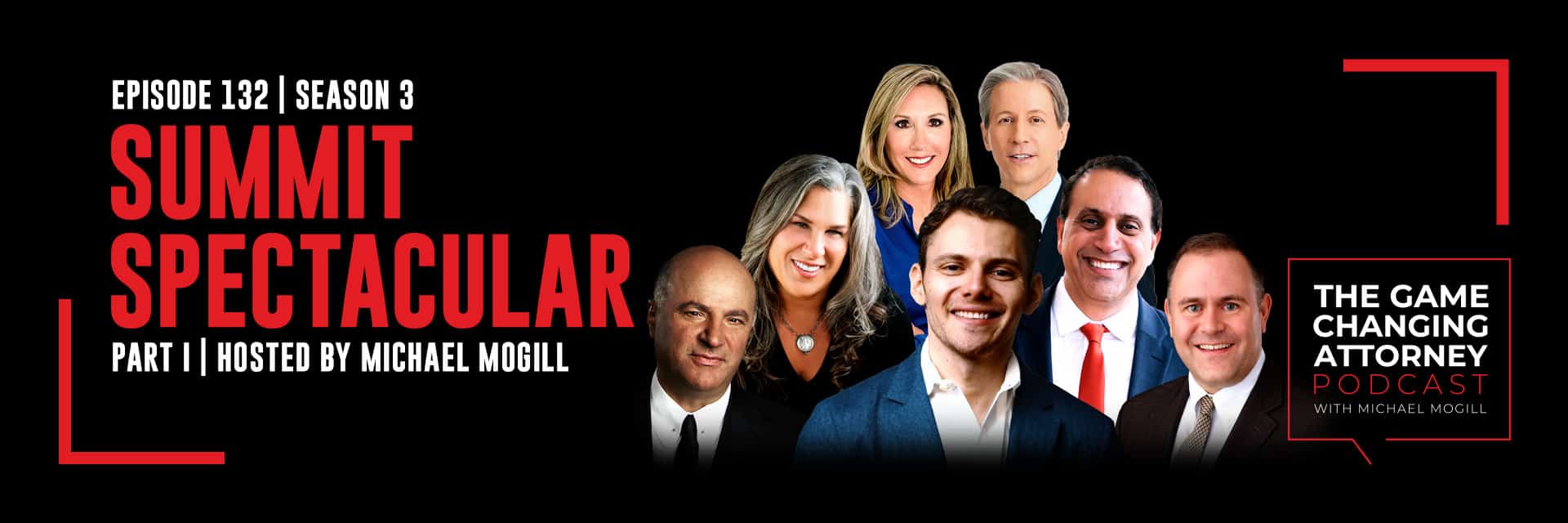
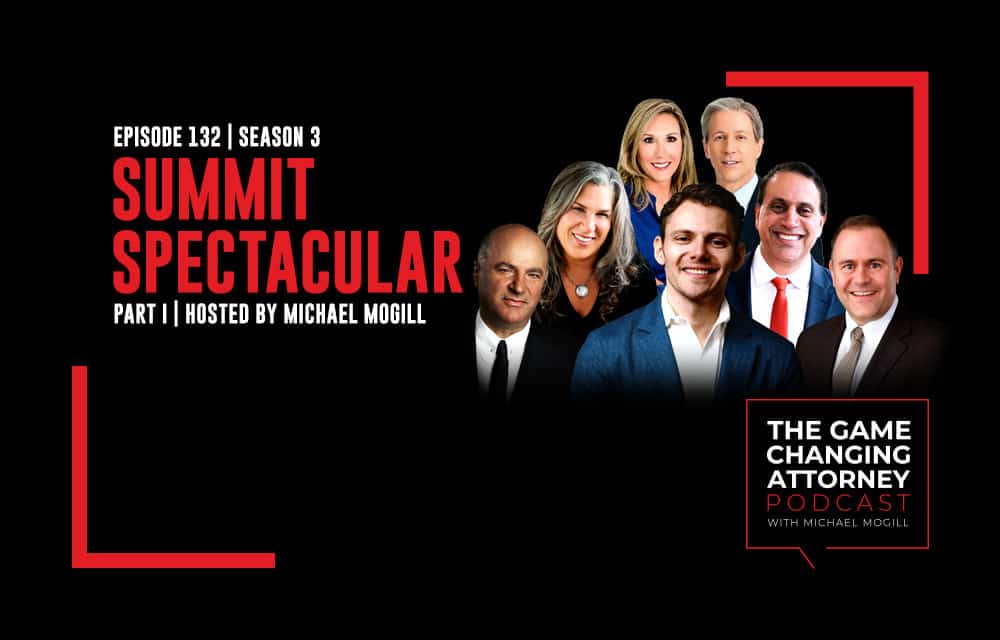
Episode 132 — Summit Spectacular: Part 1
The Game Changers Summit is a powerful catalyst for law firm owners all over the country. To get everyone in the spirit of transformation, we’re highlighting intimate conversations with some of our most highly-anticipated Summit speakers.
On this episode of The Game Changing Attorney Podcast, get to know legends in the legal industry and beyond, such as:
- Michael Mogill, Founder & CEO of Crisp
- Cy Wakeman, Workplace Drama & Leadership Expert
- Kevin O’Leary, Investor on ABC’s Shark Tank
- Jan Dils, Founder & CEO of Jan Dils, Attorneys at Law
- Eric Chaffin, Co-Founder and Managing Partner of Chaffin Luhana LLP
- Bob Tharp, Founding Partner of Meriwether & Tharp, LLC
- Alexander Shunnarah, Founder & CEO of Alexander Shunnarah Trial Attorneys
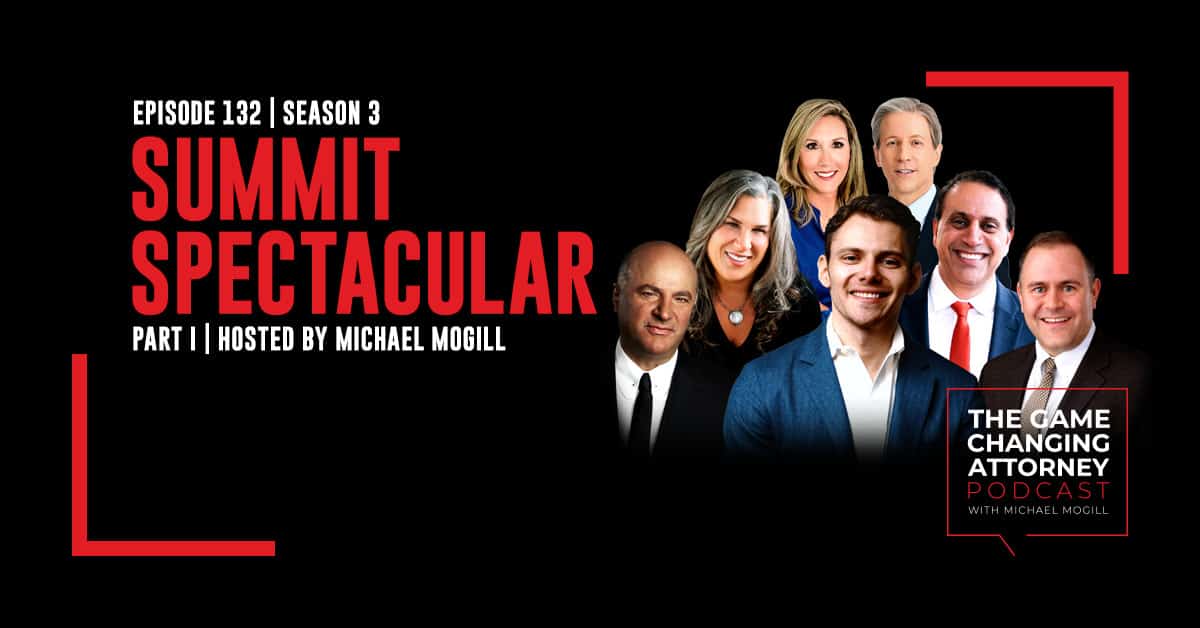
Listen & Subscribe
Show Notes:
Cy Wakeman
Defining drama. “Drama basically is the funky name for what we call emotional waste. Emotional waste is any energy that’s taken away from results or happiness, (i.e. engagement) at work. So when you think about it, it’s disruptive behavior which is usually stemming from unproductive thinking.”
A highly accountable workplace. “A lot of people say, ‘Oh Cy, it’s so hard to find good talent.’ When I hear that, I don’t experience that as an employer, but then I see the flaw in their logic. They think they have to win the talent war in their city for people in that profession. And I’m like, ‘No, you just have to be the best place for high accountables to work.’ It’s not a very hard competition. If you and I are being chased by a tiger, I don’t have to beat the tiger; I just have to beat you. So I just have to have a clean workplace where high accountables love working.”
Probation period. “We have 90 days of probation, and if you can’t live up to your interview, we’ll either extend it, or probably at my company will just say, ‘You know, we’re going to be testing you and you’re going to be testing us in 90 days.’ And that’s tricky. A lot of people say, ‘Well, nobody’s going to risk coming to you if they know they could lose their job in 90 days.’ Oh yeah? High accountables will because high accountables have nothing to fear.”
Michael Mogill
Indecisiveness is weakness. “Decision-making, to me, is about speed. It’s not about trying to be perfect, because the people doing that are the ultimate procrastinators. They use this as a shield because they don’t think it’s perfect yet, so they hide behind it.”
Beware of the mouth-breathers. “They’re the ones who have the grandiose ideas or all of the ambition, but they don’t actually get things done. I have found that if you surround yourself with these bullsh*t artists, you will have a lifetime of frustration because nothing will get off the ground. Alternatively, if you surround yourself with people who just like to get things done, the discussions become more centered around accountability and much more productive in general.”
Success begins with you. “If you’re looking for ways to destroy your own business, one way to do it is by being an absentee owner. If you don’t want to be there and aren’t passionate about what you’re trying to do, how can you expect your people to be? I don’t understand that.”
Kevin O’Leary
The real motivator. “When you become an entrepreneur, if you’re going to be successful, it’s never about the greed of money. It’s because you’re so passionate about what you’re doing. If you are that way and you’re not pursuing money, you’re pursuing freedom. To a certain extent, if you love to get up in the morning and work, you’re setting yourself free. I enjoy everything I do. At that time, we were working seven days a week, 20 hours a day, and flying all over the world. We were growing like a weed, really competitive, being very successful, and growing market share — and we loved doing it. We had a really focused team of people that had been together for almost eight years. We were brothers and sisters on this mission to be successful.”
Two types of people. “In the world, there are two types of people: the people that scrape the stuff off the floor and the people that own the store. For me, I wanted to be the store owner. That’s what set me on my journey, and I never worked for anybody again.”
Control your own fate. “Entrepreneurship is not a destination. It’s a journey. It’s not for everyone. It’s not easy. It’s hard, but the whole idea is personal freedom each day. I tell my students when I teach this, ‘Look, the whole idea of being an entrepreneur is to get to a place in your life where you do not have to pick up the phone when it rings — that nobody has control over your destiny anymore. If the phone is ringing and you don’t want to answer it, you don’t have to.’”
Eric Chaffin
Doing good by doing right. “If you want to say ‘Doing Good by Doing Right,’ you’ve got to live by it. You’ve got to actually follow that path and walk that walk. We do that as a firm. We make a conscious decision about what we’re going to invest our time and money into, and then we go in and we do it. That’s something that we’re very proud of.”
The ultimate client experience. “We like to stay connected with our clients. We even use John Ruhlin’s ideas of Giftology to keep in touch with them, and basically take all of the pieces of our relationship with them and put it all together. We have a Client Success Manager named Staci whose main job is to make sure our clients have the best experience possible. It takes different skills, hats, and abilities to do that on mass tort and personal injury practices. We want to automate as many touchpoints as possible.”
It’s all part of the journey. “Obtaining closure in a case is really important for both the clients and us. If you’re going to seek justice, you’ve got to obtain justice in the process. Part of that for us is to support our clients in healing, and that takes on many different forms. Some of it’s just simply listening to our clients.”
Bob Tharp
It’s all about the game of inches. “Everyone talks about going the extra mile, but we talk about going the extra inch, which is doing everything a little bit better. The cumulative effect of a marginal improvement is that, as you grow in size, a lot more can happen at a faster rate. If one person bills an extra half hour each week, it’s probably not going to swing the dial, but if you have 40+ attorneys doing it, you will see a huge difference. To me, it’s the one percent game. It’s not that we’re a better firm — there are a lot of great attorneys out there. But we really try to push that extra one percent every chance we can on everything that we do, whether it’s marketing, intake, case management, or building out our systems.”
The evolution of Bob’s leadership skills. “I’m not sure that I would have even called myself a leader in the beginning. I just did what most attorneys do, which is practiced law and did my own thing. I tried to approach it with a simple Golden Rule approach: Treat others the way you want to be treated. As you grow, you realize that you’ve got to take ownership of your position in the firm, and that includes setting the pace and tone, showing what’s acceptable and what’s not, holding people accountable, and demanding for someone to be better than they were yesterday.”
How Bob defines success. “Success is always trying to get better, improve, and never resting until you’ve done those things. You should always look for opportunities to do things differently or better than you were doing before. I don’t think there’s a point where I’m ever going to be satisfied with or think that I’m done and there’s nothing more to do.”
Alexander Shunnarah
Becoming a household name. “It’s flattering really. You know, I didn’t really intend for any of that to happen. But yeah, they do dress up as me on Halloween. I can’t go to the mall anywhere without hearing something like a ‘Call Me, Alabama!’ I just went to a football game this past fall, and from where our part to the stadium was — only about a half a mile walk — I had my posse that was with me counting. I had to stop for like 43 photographs and pretty much missed kickoff, but I think it’s great because it’s my business. It’s my brand. I’m actually the brand, which I didn’t intend either.”
What drives you. “When I got to law school, I wanted my grades to be as good as anybody else’s.Then, when I got into personal injury space — and maybe this is funny — but I can’t imagine someone else being the most recognizable person or the number one law firm in Alabama. Not on my watch. I joke around that if I ever drive in Alabama and somebody has a larger law firm or is more popular than I am or is more branded, I’m just going to jump off a bridge. You know, that’s funny, but there’s no meaning for me anymore. It’s just who I am and it’s just what I do. The climb is fun, but staying on top is actually harder than the climb itself.”
Having a sound mind and body. “Fear is a good thing in certain circumstances. I think it’s the fear of regressing that keeps you motivated, but I truly believe this with all my heart: When you reach a certain level, no one can take you out but yourself. When I go to bed at night, I pray for a sound mind and sound body — because if my mind is sound and my body is sound, I don’t think anybody can take us out.”
Jan Dils
Car salesWOman. “I grew up working in my family’s Ford car business. When I was in high school, I’d work during the summers in reception and other roles like that, but as I got older I wanted a more in-depth role. Eventually, I became the first female salesman that my dad hired. I did that over the summer while I was in college and earned some money to buy computers, books, and other school supplies like that for my classes.”
Getting cold feet. “When I decided to take the LSAT and go to law school, I felt like everything was falling into place — until I actually got to law school. Once I got there, we talked about many subjects I wasn’t interested in, such as property and contracts. Any lawyer knows that the first year and a half of law school is like that. Once I got to concentrate more in the business and corporate fields of law, I felt more at home at that point.”
The wonderful world of advertising. “My dad was big on advertising his car dealership, so I saw the value in doing it. I was familiar with the traditional advertisers, such as the television, newspapers, and radio. I purchased the backside of the phonebook back in ‘94, and after that, I cut my first commercial. That’s when I truly realized the true power of advertising.”
RESOURCES & REFERENCES
Game Changers Summit
Crisp
Reality-Based Leadership
Shark Tank
Chaffin Luhana LLP
Giftology: The Art and Science of Using Gifts to Cut Through the Noise, Increase Referrals, and Strengthen Retention by John Ruhlin
Meriwether & Tharp, LLC
Alexander Shunnarah Trial Attorneys
Jan Dils, Attorneys at Law
Connect with Michael
- Text directly at 404-531-7691
